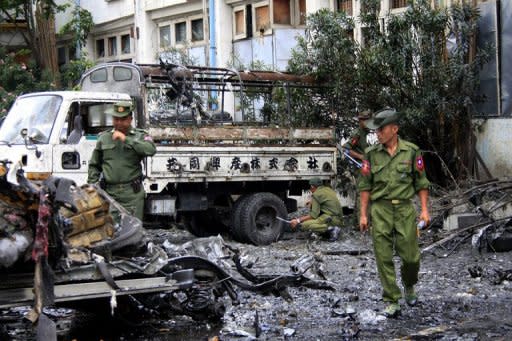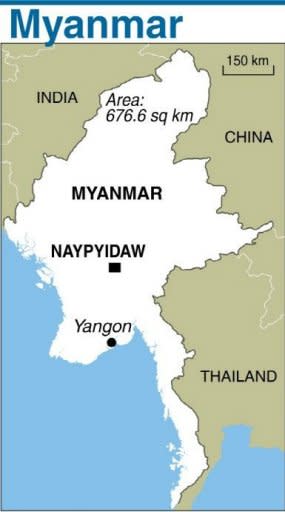Bomb blasts strike Myanmar cities
Bomb blasts rattled three Myanmar cities including the capital on Friday, an official said, the latest in a series of explosions that authorities have mostly blamed on ethnic minority rebels. The blasts rekindled security concerns at a time when pro-democracy leader Aung San Suu Kyi is preparing to launch her first political tour of the army-dominated country since her release from house arrest in November. The first explosion destroyed a car and shattered windows in the central city of Mandalay shortly before noon on Friday, a government official said. Residents said two people were injured. It was followed soon afterwards by an explosion at an unoccupied home in the capital Naypyidaw and another blast in the town of Pyin Oo Lwin in central Myanmar, said the official, who did not want to be named. A spokesman for Nobel Peace Prize winner Suu Kyi said the recent explosions might affect her plans. "We will have to take the recent bomb blasts into consideration regarding security for Daw Suu's trip," said Nyan Win, adding that a schedule for the tour has not yet been set. Security is a top concern for the party as Suu Kyi's convoy was attacked in 2003 in an ambush apparently organised by a regime frightened by her popularity. It was unclear what type of explosive devices were used in Friday's blasts, but the authorities were quick to raise the possibility that ethnic rebels were behind them. "I think insurgents wanted to show their dissatisfaction with the government by planting these bombs," said a second government official, noting that ethnic minority militias and government troops are fighting in parts of the country. Authorities blamed Karen ethnic minority rebels for an explosion on a passenger train near the capital last month which killed two people and wounded nine others. Another bomb exploded at a Naypyidaw market on June 10, slightly injuring two people. In April last year, in the worst attack in five years in Myanmar's main city Yangon, a series of blasts left 10 people dead and about 170 wounded as thousands of people gathered for festivities to mark the Buddhist New Year. Five men who were initially arrested as suspects in that attack were sentenced to up to 11 years in prison in February for different offences, after authorities failed to find evidence linking them to the blasts. The military junta handed over power to a nominally civilian administration in March after nearly half a century of army rule, following an election marred by complaints of intimidation and fraud. Myanmar has been plagued by decades of civil war with armed ethnic minority militias since independence in 1948. In recent weeks fighting has broken out between rebels in the northern state of Kachin near the Chinese border. Last November, thousands of people were driven across the border into Thailand after heavy clashes erupted on election day between the military and ethnic minority rebels in eastern Karen State. In February, eight people were injured by an explosive device believed to have been detonated accidentally in Yangon, officials said.




